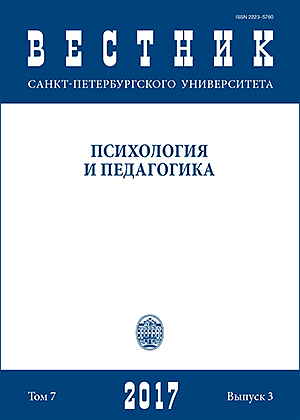Anxiety and stable emotional states in the structure of psycho-emotional wellbeing
DOI:
https://doi.org/10.21638/11701/spbu16.2017.302Abstract
The analysis of psychological concepts of wellbeing showed that hedonistic and eudemonic approaches were based on different theoretical grounds and reflected distinct areas of the inner world of a person. The eudemonic view does not include the emotional factor, whereas hedonistic approaches include it as the main one. As is known, the emotional component of wellbeing unites feelings, which are conditioned by the successful or unsuccessful functioning of all spheres of the personality, and performs regulatory and adaptive functions. The article is aimed toward theoretical and empirical substantiation of the psycho-emotional wellbeing construct. It is considered as an interrelation of hedonistic and eudemonistic aspects of wellbeing in a ratio with basic emotional characteristics of personality. The article presents the results of two correlation pilot studies (N1=228; N2=54), which confirm that anxiety and stable emotional states are including in the structure of psycho-emotional wellbeing of the adult. The total scale of psychological wellbeing (C. Ryff) negatively correlates with integral indicators of anxiety (p<.01) and positively correlates with scales of interest, emotional tone, and comfort (p<.001). Some criteria of psychological wellbeing that focus on interaction to environment such as competence and positive relations correlate with the positive stable emotional states and anxiety reduction (.001<р<.05). Autonomy and personal growth do not have any connections with the scales of emotional states and are the least comprised in the structure of psycho-emotional wellbeing. The results confirm the advisability of promoting the construct of psycho-emotional wellbeing as a more holistic one.
Keywords:
psycho-emotional wellbeing, anxiety, stable emotional states, happiness, hedonistic wellbeing, eudemonistic wellbeing
Downloads
References
Argyle M. Psikhologiia schast’ia [ The psychology of happiness]. Transl. from Engl.; 2nd ed. St. Petersburg, Piter Publ., 2003. 623 p. (In Russian)
Downloads
Published
How to Cite
Issue
Section
License
Articles of "Vestnik of Saint Petersburg University. Psychology" are open access distributed under the terms of the License Agreement with Saint Petersburg State University, which permits to the authors unrestricted distribution and self-archiving free of charge.




